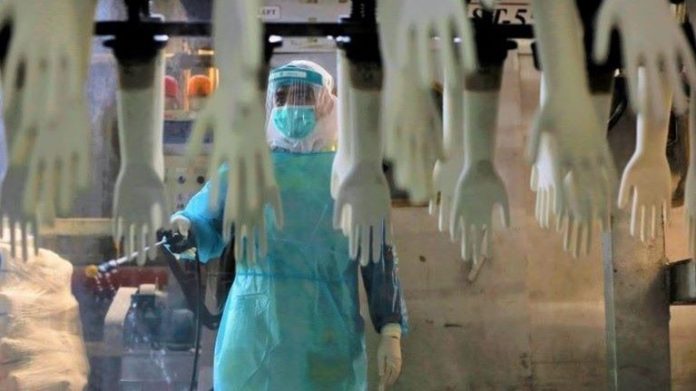New ILO study highlights steps to strengthen decent work in Malaysia’s rubber glove supply chain
Actions to enhance labour rights, social dialogue and fair recruitment practices are needed to strengthen decent work in the Malaysian rubber glove sector according to a new International Labour Organization (ILO) report. The findings aim to promote action and provide guidance to the Government of Malaysia, employers’ and workers’ organizations, buyers of rubber gloves, recruitment agencies and other key industry stakeholders.
Key recommendations made by the report include the need to strengthen rights at work by continuing to align Malaysian labour laws with international standards. Particular attention should be paid to working hours – especially overtime hours permitted – as well as ensuring safe and healthy working and living environments. Enforcement capacity at the Department of Labour should also be reinforced so that it can regularly inspect workplaces to monitor compliance with labour laws.
The report highlights how strengthened social dialogue would support employers to identify and resolve workplace issues and enable workers to collectively negotiate for better and safer working conditions. While the weak presence of unions in the sector is noted, glove manufacturing workers who participated in this study expressed a desire to join a union if one were active. The need for greater promotion of fair recruitment practices in the sector, including through relevant labour law reform that would, inter alia, prohibit recruiters and employers from charging recruitment fees and related costs to workers is also stressed. Other recommendations include the need to strengthen the capacity of employers to conduct due diligence in their supply chains, including on recruitment agencies and labour sub-contractors as well as improving grievance mechanisms.
Speaking about the findings, Ms. Panudda Boonpala, ILO’s Deputy Regional Director for Asia and the Pacific said: “The research provides an analysis of the decent work challenges and opportunities in the rubber glove supply chain in Malaysia. We trust that the findings and recommendations will be of use for the Government, employers’ and workers’ organizations and the other supply chain stakeholders in generating and imple¬menting new policies, plans, tools and training to address the challenges and harness the opportunities for promoting decent work in the rubber glove supply chain.” Decent work challenges and opportunities in Malaysia’s rubber glove supply chain was developed within the framework of the Sustainable Supply Chain to Build Forward Better (SSCBFB) project, a joint initiative of the ILO and the European (EU) to advance decent work in key global supply chains of key importance. Malaysia is the world’s largest exporter of rubber gloves, contributing more than 60 per cent of global glove exports. The sector employs around 70,000 workers, of which about 60 per cent are migrant workers.























